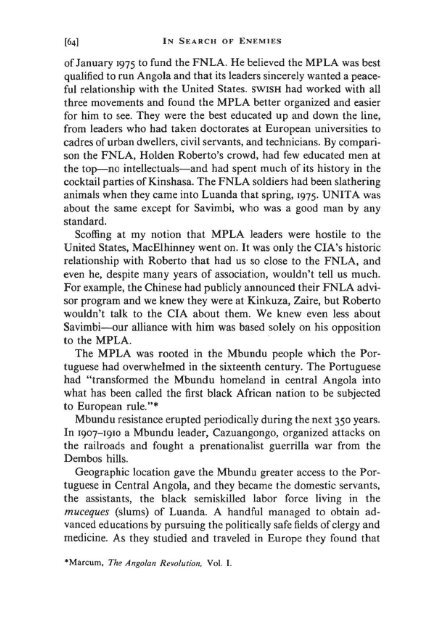In Search of Enemies - A CIA Story - John Stockwell
In Search of Enemies - A CIA Story - John Stockwell
In Search of Enemies - A CIA Story - John Stockwell
Create successful ePaper yourself
Turn your PDF publications into a flip-book with our unique Google optimized e-Paper software.
IN SEARCH OF ENEMIES<br />
<strong>of</strong> January 1975 to fund the FNLA. He believed the MPLA was best<br />
qualified to run Angola and that its leaders sincerely wanted a peaceful<br />
relationship with the United States. SWISH had worked with all<br />
three movements and found the MPLA better organized and easier<br />
for him to see. They were the best educated up and down the line,<br />
from leaders who had taken dQctorates at European universities to<br />
cadres <strong>of</strong> urban dwellers, civil servants, and technicians. By comparison<br />
the FNLA, Holden Roberto's crowd, had few educated men at<br />
the top--no intellectuals-and had spent much <strong>of</strong> its history in the<br />
cocktail parties <strong>of</strong> Kinshasa. The FNLA soldiers had been slathering<br />
animals when they came into Luanda that spring, 1975. UNIT A was<br />
about the same except for Savimbi, who was a good man by any<br />
standard.<br />
Sc<strong>of</strong>fing at my notion that MPLA ]eaders were hostile to the<br />
United States, MacElhinney went on. It was only the <strong>CIA</strong>'s historic<br />
relationship with Roberto that had us :so close to the FNLA, and<br />
even he, despite many years <strong>of</strong> association, wouldn't tell us much.<br />
For example, the Chinese had publicly announced their FNLA advisor<br />
program and we knew they were at Kinkuza, Zaire, but Roberto<br />
wouldn't talk to the <strong>CIA</strong> about them. We knew even less about<br />
Savimbi-our alliance with him was based solely on his opposition<br />
to the MPLA. .<br />
The MPLA was rooted in the Mbundu people which the Portuguese<br />
had overwhelmed in the sixteenth century. The Portuguese<br />
had "transformed the Mbundu homeland in central Angola into<br />
what has be,en called the first black African nation to be subjected<br />
to European rule."*<br />
Mbundu resistance erupted periodically during the next 350 years.<br />
<strong>In</strong> 1907-1910 a Mbundu leader, Cazuangongo, organized attacks on<br />
the railroads and fought a prenationalist guerrilla war from the<br />
Dembos hills.<br />
Geographic location gave the Mbundu greater access to the Portuguese<br />
in Central Angola, and they became the domestic servants,<br />
the assistants, the black semiskilled labor force living in the<br />
muceques (slums) <strong>of</strong> Luanda. A handful managed to obtain advanced<br />
educations by pursuing the politically safe fields <strong>of</strong> clergy and<br />
medicine. As they studied and traveled in Europe they found that<br />
*Marcum, The Angolan Revolution. Vol. I.


